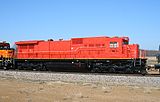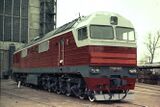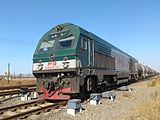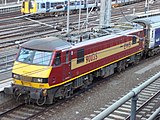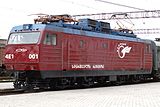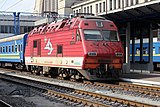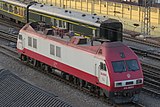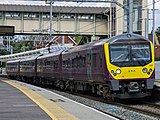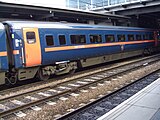Kráľovské Holynské Železnice: Difference between revisions
| (12 intermediate revisions by the same user not shown) | |||
| Line 37: | Line 37: | ||
'''Kráľovské Holynské Železnice AS''' (English: Royal Holyn Railways AS) is the {{wp|national railway}} company of [[Holynia]]. It is owned by the [[Holynia|Holyn government]] through [[Holinvestičnéholdingy]], receiving annual subsidies. It received the assets of Holyn State Railways in 2002, following the passage of the Railways Act of 2002. It owns and maintains 90% of the railway network in Holynia and operates roughly 70% of the services. Initially holding a monopoly on the railways in Holynia, it now faces competition from the private sector on both passenger and cargo services. | '''Kráľovské Holynské Železnice AS''' (English: Royal Holyn Railways AS) is the {{wp|national railway}} company of [[Holynia]]. It is owned by the [[Holynia|Holyn government]] through [[Holinvestičnéholdingy]], receiving annual subsidies. It received the assets of Holyn State Railways in 2002, following the passage of the Railways Act of 2002. It owns and maintains 90% of the railway network in Holynia and operates roughly 70% of the services. Initially holding a monopoly on the railways in Holynia, it now faces competition from the private sector on both passenger and cargo services. | ||
== Train categories == | == Train categories == | ||
[[File:Amsterdam_CS_Thalys_2023.jpg|thumb|right|250px|A Class 500 Blesk train in Cizekporok.]] | |||
=== Long-distance trains === | === Long-distance trains === | ||
=== | ==== Blesk ==== | ||
[[File:Colton_Junction_-_geograph.org.uk_-_330509.jpg|thumb|right|250px|A KHŽ Class 435 hauling an Rýchly service to Cizekporok.]] | |||
=== SperoRail === | ''Blesk '' ({{wp|Slovak language|Hornat}}: ''Lightning'') are long-distance fast train services between major cities and regions. One route crosses the border into Movargovina. High Speed services began on the Cizekporok to Slatnik in 1987. A second line to Jalovec opened in 1994. Services were speed limited in 1996, owing to reduced budgets for track maintenance. A third high speed line under construction, between Uhrov and Zalubie, was opened in 2006. In 2012, the South Coast High Speed railway opened between Komarov and Valaskov, via Slatnik. The dedicated equipment for high speed services are the KHŽ Class 437, KHŽ Class 500 and KHŽ Class 520 trains. KHŽ Class 435s originally operated high speed services until 1990, when they were replaced by 437s. | ||
Seat reservations are required on board Blesk services in both First and Standard classes. These services offer dining services at seat and in a dedicated dining car/section. Blesk trains are either red/silver or red/black trainsets. | |||
==== Rýchly ==== | |||
[[File:Rychly_2.jpg|thumb|right|250px|A ''Rýchly 2'' trainset, which is intended to supplement and gradually replace the KHŽ Class 435.]] | |||
''Rýchly'' ({{wp|Slovak language|Hornat}}: ''Fast'') are long distance express services that are marketed above InterCity Express but below Blesk. These typically operate on the ''classic'' lines like InterCity, but offer a more premium service similar to Blesk services. These trains utilize a blue paint scheme with a red stripe. First and Standard class both have at seat dining services. Similar to Blesk, seat reservations are required. KHŽ Class 435 are the most common equipment, however the ''Rýchly 2'' trainsets hauled by KHŽ Class 511 locomotives | |||
[[File:C00_516_Bf_Poprad-Tatry,_WLABmee.jpg|thumb|right|250px|A Holyn Sleeper service in Tisula.]] | |||
==== SperoRail ==== | |||
SperoRail are intercity trains that cross Spero borders, and connect Holynia with other countries. These services are promoted by KHZ and the Spero Community. Are frequently operated by foreign state railways. All are locomotive hauled using conventional equipment. Frequently reach up to 180 km/h. | SperoRail are intercity trains that cross Spero borders, and connect Holynia with other countries. These services are promoted by KHZ and the Spero Community. Are frequently operated by foreign state railways. All are locomotive hauled using conventional equipment. Frequently reach up to 180 km/h. | ||
=== Holyn Sleeper === | ==== Holyn Sleeper ==== | ||
Holyn Sleeper are night services between major cities and regions in Holynia, and services to international countries operated by KHZ. Several domestic trains are named. Some services only operate seasonally. | Holyn Sleeper are night services between major cities and regions in Holynia, and services to international countries operated by KHZ. Several domestic trains are named. Some services only operate seasonally. | ||
===InterCity Express=== | [[File:Czech_Raildays_2015,_Bdmpeer_ZSSK_(01).jpg|thumb|right|250px|An InterCity coach class Series 6 car.]] | ||
====InterCity Express==== | |||
InterCity Express are semi high-speed long-distance train services between major cities and regions. Typically operate at 200 km/h to 220 km/h. The KHŽ Class 435 is the most common equipment on these services, however, newer multiple units like the KHŽ Class 532, are frequently operating InterCity Express services. | InterCity Express are semi high-speed long-distance train services between major cities and regions. Typically operate at 200 km/h to 220 km/h. The KHŽ Class 435 is the most common equipment on these services, however, newer multiple units like the KHŽ Class 532, are frequently operating InterCity Express services. | ||
=== InterCity === | ==== InterCity ==== | ||
InterCity are long-distance train services between major cities and regions. Much more frequent than InterCity Express services but make more stops. Typically locomotive hauled, however, bi-level multiple units, the KHŽ Class 529, are operating some services. | InterCity are long-distance train services between major cities and regions. Much more frequent than InterCity Express services but make more stops. Typically locomotive hauled, however, bi-level multiple units, the KHŽ Class 529, are operating some services. | ||
Latest revision as of 02:12, 19 November 2024
 | |
| State owned public limited company | |
| Industry | Railways |
| Predecessor | Holyn State Railways (1941-2002) |
| Founded | 10 May 2002 |
| Headquarters | , |
Area served | Holynia |
| Services | Rail transport, Cargo |
| Owner | Holinvestičnéholdingy (Holyn government) (100%) |
Number of employees | 110,000 (2018) |
| Website | Holyn Railways (English) |
Kráľovské Holynské Železnice AS (English: Royal Holyn Railways AS) is the national railway company of Holynia. It is owned by the Holyn government through Holinvestičnéholdingy, receiving annual subsidies. It received the assets of Holyn State Railways in 2002, following the passage of the Railways Act of 2002. It owns and maintains 90% of the railway network in Holynia and operates roughly 70% of the services. Initially holding a monopoly on the railways in Holynia, it now faces competition from the private sector on both passenger and cargo services.
Train categories
Long-distance trains
Blesk
Blesk (Hornat: Lightning) are long-distance fast train services between major cities and regions. One route crosses the border into Movargovina. High Speed services began on the Cizekporok to Slatnik in 1987. A second line to Jalovec opened in 1994. Services were speed limited in 1996, owing to reduced budgets for track maintenance. A third high speed line under construction, between Uhrov and Zalubie, was opened in 2006. In 2012, the South Coast High Speed railway opened between Komarov and Valaskov, via Slatnik. The dedicated equipment for high speed services are the KHŽ Class 437, KHŽ Class 500 and KHŽ Class 520 trains. KHŽ Class 435s originally operated high speed services until 1990, when they were replaced by 437s.
Seat reservations are required on board Blesk services in both First and Standard classes. These services offer dining services at seat and in a dedicated dining car/section. Blesk trains are either red/silver or red/black trainsets.
Rýchly
Rýchly (Hornat: Fast) are long distance express services that are marketed above InterCity Express but below Blesk. These typically operate on the classic lines like InterCity, but offer a more premium service similar to Blesk services. These trains utilize a blue paint scheme with a red stripe. First and Standard class both have at seat dining services. Similar to Blesk, seat reservations are required. KHŽ Class 435 are the most common equipment, however the Rýchly 2 trainsets hauled by KHŽ Class 511 locomotives
SperoRail
SperoRail are intercity trains that cross Spero borders, and connect Holynia with other countries. These services are promoted by KHZ and the Spero Community. Are frequently operated by foreign state railways. All are locomotive hauled using conventional equipment. Frequently reach up to 180 km/h.
Holyn Sleeper
Holyn Sleeper are night services between major cities and regions in Holynia, and services to international countries operated by KHZ. Several domestic trains are named. Some services only operate seasonally.
InterCity Express
InterCity Express are semi high-speed long-distance train services between major cities and regions. Typically operate at 200 km/h to 220 km/h. The KHŽ Class 435 is the most common equipment on these services, however, newer multiple units like the KHŽ Class 532, are frequently operating InterCity Express services.
InterCity
InterCity are long-distance train services between major cities and regions. Much more frequent than InterCity Express services but make more stops. Typically locomotive hauled, however, bi-level multiple units, the KHŽ Class 529, are operating some services.
Regional trains
- InterRegio for long-distance train services between regions and centers in Holynia. Lower in class than InterCity but more frequent. Makes more stops than InterCity.
- Regional Express for semi-fast regional service making stops within regions in Holynia.
- Regional for regional services making stops within regions in Holynia. Often most basic train available operated by KHZ.
- Suburban for suburban commuter rail services in major cities. KHZ passed these services over to the respective regional transport entity, however, most operate on KHZ trackage.
Rolling stock
Diesel-electric locomotives
| Class | Entered service | Use | Number in service | Power output | Remarks |
|---|---|---|---|---|---|
| 105 | 1970 | General goods/pusher/work trains | 82 | 2,208 kW (2,961 hp) | Will be retired 2025. |
| 106 | 1975 | General goods/bulk cargo/work trains | 567 | 1,472 kW (1,974 hp) | |
| 109 | 1977 | General goods/work trains | 781 | 1,103 kW (1,479 hp) | |
| 110 | 1979 | Yard switcher/local train/work trains | 82 | 2,350 kW (2,150 hp) | |
| 112 | 1980 | General goods/bulk cargo/intermodal | 1,214 | 4,500 kW (6,035 hp) | |
| 114 | 1984 | Yard switcher/local train/work trains | 106 | 3,000 kW (4,000 hp) | |
| 117 | 1989 | General goods/bulk cargo/intermodal | 47 | 2 x 6,000 hp | |
| 120 | 1999 | Passenger trains | 201 | 1,864 kW (2,500 hp) | |
| 121 | 1999 | General goods/bulk cargo/intermodal/work trains | 357 | 2,240 kW (3,000 hp) | Tight loading gauge compliant locomotives |
| 124 | 2005 | General goods/bulk cargo/intermodal/work trains | 406 | 5,000 kW (6,705 hp) total | Typically a married pair of 2 units. |
| 127 | 2007 | General goods/bulk cargo/intermodal/work trains | 61 | 3,184 kW (4,270 hp) | |
| 129 | 2010 | General goods/bulk cargo/intermodal/work trains | 301 | 4,700 kW (6,300 hp) | |
| 130 | 2010 | General goods/bulk cargo/intermodal/work trains | 200 | 9,300 hp | 3 106 married locomotives with cabless "B" unit |
| 132 | 2012 | Passenger trains | 76 | 2,800 kW (3,800 hp) | |
| 133 | 2014 | General goods/bulk cargo/intermodal/work trains | 407 | 2,000 kW (2,700 hp) | |
| 134 | 2015 | General goods/bulk cargo/intermodal/work trains | 975 | 4,660 kW (6,250 hp) |
Electric locomotives
| Class | Entered service | Use | Number in service | Remarks |
|---|---|---|---|---|
| 424 | 1977 | Cargo division | 41 | Limited service, expected to be retired by 2023. |
| 429 | 1979 | Cargo division | 82 | |
| 430 | 1980 | Passenger/Cargo divisions | 517 | |
| 431 | 1984 | Passenger/Cargo divisions | 879 | |
| 433 | 1982 | Cargo division | 63 | |
| 435 | 1989 | Passenger division | 81 | Designed to operate with Series 5 coaches. |
| 436 | 1993 | Passenger/Cargo divisions | 50 | |
| 439 | 1996 | Passenger division | 22 | |
| 440 | 2001 | Cargo division | 871 | Married pair designed for heavy haul services |
| 441 | 2002 | Passenger division | 81 | |
| 443 | 2005 | Passenger/Cargo divisions | 137 | |
| 447 | 2006 | Cargo division | 87 | Married pair |
| 449 | 2007 | Cargo division | 1,150 | |
| 450 | 2009 | Cargo division | 622 | Married pair designed for heavy haul services. |
| 452 | 2012 | Passenger/Cargo divisions | 95 | |
| 453 | 2012 | Cargo division | 527 | Second generation of Class 449 |
| 454 | 2014 | Passenger/Cargo divisions | 527 | Second generation of Class 449 |
| 455 | 2015 | Passenger division | 91 | |
| 456 | 2016 | Passenger/Cargo divisions | 762 | Intended to replace older electric locomotives |










